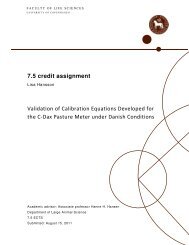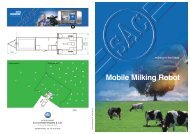Innovative Technology and Sustainable Development of Organic - 1.
Innovative Technology and Sustainable Development of Organic - 1.
Innovative Technology and Sustainable Development of Organic - 1.
Create successful ePaper yourself
Turn your PDF publications into a flip-book with our unique Google optimized e-Paper software.
consumers. Consumers’ image was considered to be affected negatively by a reduction in grazing<br />
time, affecting both milk quality <strong>and</strong> animal welfare. The Dutch as well as the Danish farmers were<br />
more radical than their advisors in their suggestions for solving the grazing problem, stating that if<br />
colleagues could not live up to the grazing st<strong>and</strong>ard, they should stop. Within all groups, there were<br />
different perceptions on the effect <strong>of</strong> grazing on welfare, health, product quality, <strong>and</strong> economy. In<br />
particular, the Danish advisors disagreed that grazing automatically enhances animal welfare.<br />
The participants did not recognize eutrophication, as result <strong>of</strong> grazing a large number <strong>of</strong> cows on a<br />
relatively small area, as a problem caused by AMS. The milk quality problem related to AMS use,<br />
although acknowledged as crucial towards consumers, was not prioritized very highly, especially not<br />
by farmers in both countries. All groups were, however, unanimous in their perception <strong>of</strong> how<br />
important image was as far as the consumers are concerned. The perception analysis revealed that<br />
Dutch participants were concerned more about the economic pay<strong>of</strong>f <strong>of</strong> AMS, <strong>and</strong> showed more<br />
reluctance towards enlargement. In addition, they acknowledged the small-scale naturalness <strong>of</strong> organic<br />
production, <strong>and</strong> as their primary goal they did not express growth or increasing productivity. These<br />
differences in perception could possibly explain observed differences in AMS use in organic dairy<br />
production between Denmark <strong>and</strong> the Netherl<strong>and</strong>s, where the Danish, parallel to their conventional<br />
colleagues, exp<strong>and</strong> the size <strong>and</strong> try to replace manual labour by machines, whereas the Dutch seek<br />
other ways to support their income.<br />
The stakeholders’ perceptions were in many ways parallel to literature review based on AMS use<br />
on conventional farms. The focus group interview technique showed its ability to identify perceptions<br />
<strong>of</strong> stakeholders regarding sustainability issues <strong>of</strong> AMS use on organic dairy farms as also problems<br />
<strong>and</strong> mitigation options for implementation. In addition, the focus group interview technique identified<br />
differences in perception between the Dutch <strong>and</strong> Danish participants for the future <strong>of</strong> organic farming<br />
<strong>and</strong> future developments addressing AMS.<br />
Thesis Frank W. Oudshoorn 35




